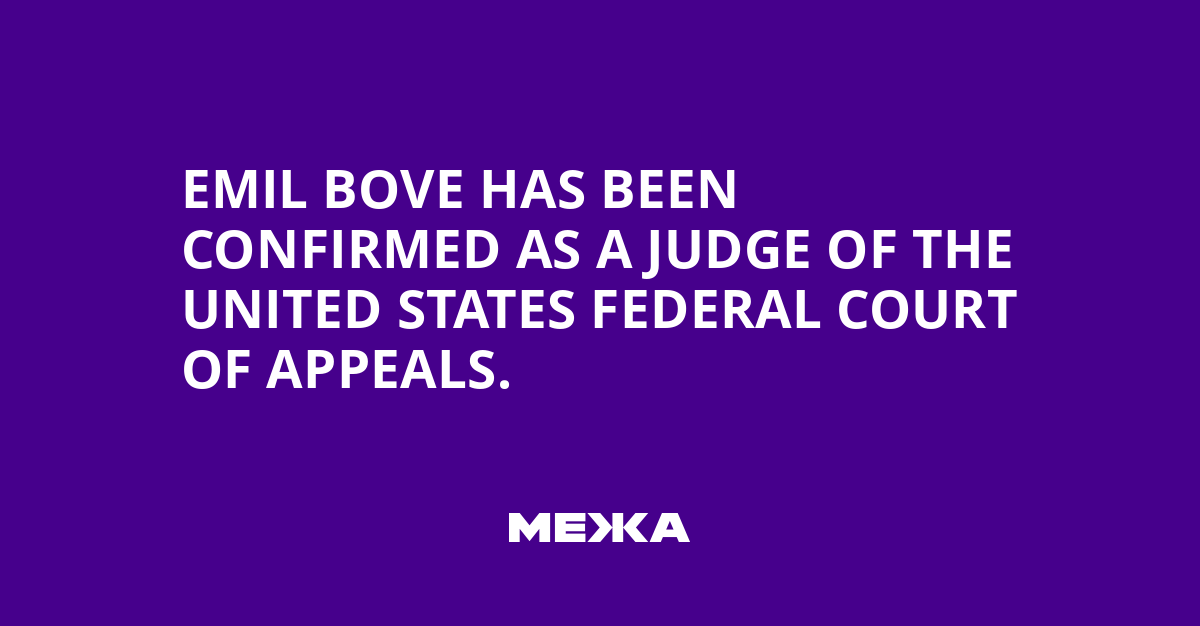Emil Bove, a former attorney for Donald Trump and a senior official at the Department of Justice, has been confirmed as a federal appellate judge with a lifetime appointment. This decision sparked outrage among Democrats and whistleblowers, who accused him of inadequate oversight of the administration’s cases.
Bove’s nomination to the U.S. Third Circuit Court of Appeals became one of the most controversial during Trump’s presidency, especially within the legal community, where significant opposition arose from hundreds of former prosecutors and judges.
Despite complaints from three whistleblowers presented to the Senate Judiciary Committee, Bove’s nomination was not halted. The complaints alleged that Bove, while a leader at the Department of Justice, pressured subordinates to follow the president’s policies even in the face of strong resistance.
The Senate confirmed his nomination by a 50-49 vote, largely along party lines.
A Department of Justice spokesperson previously stated that Bove “will make an excellent judge.”
“Emil Bove is a highly qualified judicial nominee who has done incredible work at the Department of Justice, helping to protect civil rights, dismantle foreign terrorist organizations, and make America safe again,” said spokesperson Gates McGavick.
Among the whistleblowers’ accusations were concerns about Bove’s interactions with prosecutors. Specifically, some members of the Senate Judiciary Committee received information about an audio recording of a meeting between Bove and prosecutors, in which he allegedly pressured them to drop a corruption case against New York City Mayor Eric Adams.
Democrats on the committee investigated whether the whistleblowers’ testimonies matched Bove’s statements about this meeting, where he denied threatening the prosecutors. CNN was not able to listen to the recording.
Two other whistleblowers also approached the Committee with concerns about Bove’s approach to courts in the context of Trump’s immigration policies, which sometimes deprived detainees of due process rights.
Following some of the accusations, Democrats on the committee staged a protest by walking out of the vote. However, Bove’s nomination advanced as all 12 Republicans on the committee supported it.
Before the final vote, Democratic Senator Cory Booker announced he had received new documents related to Bove’s actions and possessed “substantial information” he was ready to share with colleagues.
Senator Dick Durbin accused Republicans of rushing the vote amid new allegations.
“It seems my Republican colleagues are afraid of the answers,” he said ahead of Bove’s final vote.
Senate Judiciary Committee Chairman Chuck Grassley stated that his office reviewed the whistleblowers’ allegations and found no misconduct by Bove.
Grassley dismissed the accusations, noting that Democrats did not provide the whistleblowers’ documents in a timely manner.
“This timeline raises serious concerns and is rightly considered a major problem,” Grassley said.
Ultimately, the whistleblowers’ disclosures did not lead to the public release of the audio recording or transcripts of the Adams case.
Although most Republican senators supported Bove, some party members expressed concerns. Republicans Lisa Murkowski and Susan Collins opposed his nomination, stating they could not trust his impartiality.
However, key Republicans such as Senator Thom Tillis backed Bove’s nomination.
Trump nominated Bove to the Third Circuit Court of Appeals in May, which oversees federal precedents in Pennsylvania, New Jersey, and Delaware.
Before working at the Department of Justice, Bove was Trump’s private attorney in several criminal cases. The Adams case raised many questions about his suitability for the federal bench.
Recently, a new whistleblower emerged, claiming that Bove instructed lawyers to ignore court orders during legal battles in immigration cases.
This situation continues to provoke discussion and concern among lawmakers and the public.

